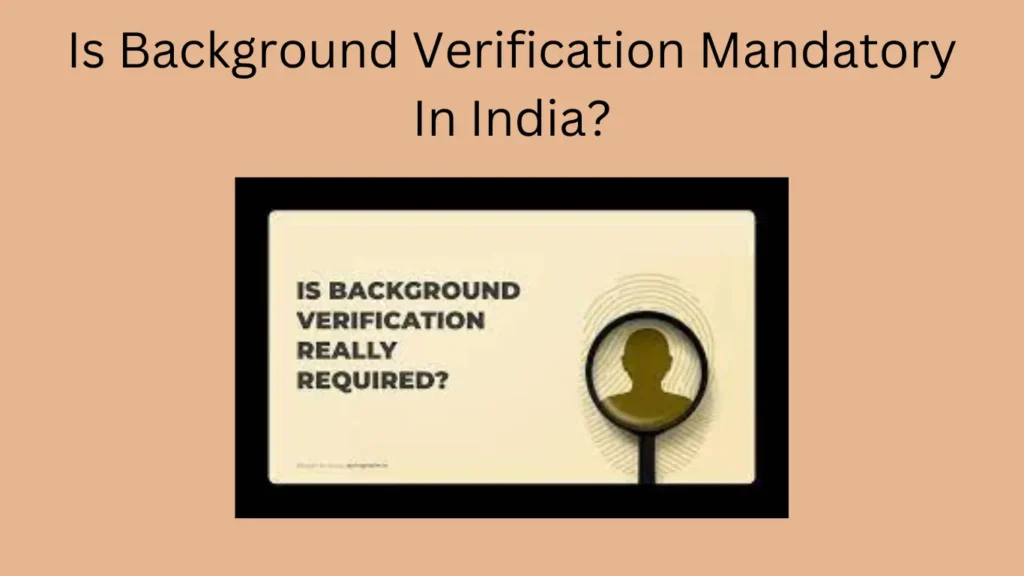Indeed, background checks are required since every company wants to hire people who are skilled, reliable, and reputable and who will actively contribute to their productivity.
Employers appoint people who have access to confidential client and company information. Fraud mitigation on the candidate is necessary to guarantee that the data is not misused. A background check policy should be in place at every business to protect it from major lawsuits involving careless hiring practices and data leaks.
Every applicant must undergo a thorough background investigation, which includes verifying their names, residence addresses, previous employment histories, academic standing, CIBIL scores, criminal histories, court record checks, and social media accounts.
Some background check companies are not aware of the requirements of the Data Privacy Law.
The Indian Supreme Court has ruled that the right to privacy is a basic freedom guaranteed by the Indian Constitution. The way that businesses use data is altered by this. The purpose of this legislation is to reduce infringement on an individual’s privacy. Since it is no longer acceptable to utilize personal data arbitrarily, these background check organizations often handle data in a highly compliant manner. This kind of data misuse will not be possible for either the government or the commercial sector.
Checks like criminal histories and court records are exempt from consent requirements under data privacy regulations because they are public documents that anybody may access. Permission is required for biometric data and financial information, and legitimate background check organizations always get people’s permission before performing these checks. Even reference checks are completed, and the candidate is informed before they are completed.
A corporation would not want to fall victim to careless recruiting since poor recruits can permanently harm a business by inducing unfavorable workplace cultures, decreasing productivity, data thefts, and other issues. Suits may result in disproportionate financial losses. A few justifications for performing background checks are listed below.establishing a safe, healthy work environment that inspires and makes stakeholders and employees feel comfortable.
· Openness is an essential aspect that needs to be guaranteed on both fronts.
· Removing the factor of doubt from the recruiting procedure
Increasing productivity by admitting just the most conscientious applicants
Bringing on a new employee means investing not only money but also time and energy. It is essential for companies to conduct due diligence on a candidate before employing them. They feel more at ease and self-assured after receiving the final background check reports.
Sixty-eight percent of people today use fabricated resumes when applying for jobs.
We have to accept that there is a gap in the process—the absence of a centralized method for thoroughly verifying a candidate’s past. Certain businesses that properly perform background checks can handle the complete background screening process. Businesses can use background checks to win contracts with both domestic and international customers. Our client, who is located in Singapore, was pleased with the thorough background check report we generated. They utilized it as a working prototype so they could present our reports to potential customers. This consequently resulted in the acquisition of an advantageous contract.
Being an ISO 27001 accredited organization, it satisfies the need for all firms that perform fraud mitigation activities. Some businesses face criticism for their discriminatory employment practices, and a small number have even faced legal action. “Unconscious bias” in hiring is a real thing. Background checks remove prejudice since they are objective, fact-based, and gender-neutral. They also produce substantial evidence.” People are qualified or disqualified based on substantial evidence after undergoing background screening.
A business might also benefit from greater operational and financial flexibility by outsourcing the background check process. They are able to focus the majority of their time on planning and finding methods to increase total revenue for their business. In our nation, background checks are in fact required as they reveal the factors that businesses find important.
For further Inquires Contact Us
FAQs
Q: Is background verification mandatory for all employees in India?
- A: While background verification is not mandatory for all employees, certain sectors and roles may require it as per industry regulations or company policies.
Q: Which sectors in India typically require background verification?
- A: Sectors such as banking, finance, healthcare, education, and government often require background verification due to the sensitive nature of the work involved.
Q: What information is typically verified during background verification in India?
- A: Background verification in India may include checks for criminal records, educational qualifications, employment history, address verification, and reference checks.
Q: What are the implications of not conducting background verification in India?
- A: Not conducting background verification can lead to risks such as hiring unqualified or dishonest employees, which can impact the organization’s reputation and security.
Q: How can employers ensure compliance with background verification laws in India?
- A: Employers should familiarize themselves with relevant laws and regulations, work with reputable background screening agencies, and ensure transparency and consent from employees undergoing verification.
